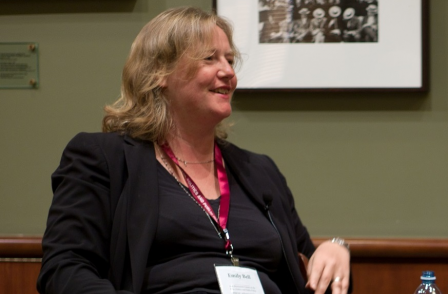
Former Guardian executive Emily Bell suggested search giant Google was guilty of “naked dishonesty” for concealing the fact it handed private emails sent between Wikileaks staffers to the FBI.
Bell (pic: LCC), who was Guardian director of digital content until 2010 and is now director of the Tow Centre for Digital Journalism in the US, delivered the annual Cudlip lecture at the London College of Communications.
She used it to talk about the power about how “super platforms” such as Google, Facebook and Twitter now “are the free press”. And she also said that the web had led to the “tabloidisation” of all journalism.
Talking about the revelation by The Guardian this week that Google handed over private emails sent between Wikileaks staff to the FBI, she said: “Google is legally obliged to do such a thing when presented with a warrant.
“However Google chose not to tell the staffers at WikiLeaks that they had handed over the material for nearly three years.
“Google has been encouraging us to think of it as a platform that supports free speech, its several hundred thousand dollar contribution to Charlie Hebdo a case in point. This is a chilling reminder of either how little Google understands what supporting free speech means or it’s naked dishonesty.
“It is inconceivable that a serious news organisation would do such a thing to a source and not be put out of business. It calls into question Google’s trustworthiness as a platform.
“It also highlights how poorly the press has behaved in respect of Wikileaks. As Trevor Timm, head of the Freedom of the Press Foundation wrote for the Guardian: ‘The outrageous legal attack on WikiLeaks and its staffers…is an attack on Freedom of the Press itself and it’s shocking more people aren’t raising their voices (and pens and keyboards) in protest’.
“Healthy journalism relies of a system, which supports all parts of a free press, and at the moment we don’t have that.”
Talking about the “tabloidisation of everyting” online, she said: “All news outlets need numbers in the web economy that are vastly greater than they had in an analogue world firstly to make the economics work and secondly to have an impact.
“The demands of web scale economics have torpedoed the local news model; they have also driven great invention and a new set of entrepreneurial skills into journalism.
“But attaining size in the world we are going into means surrendering control to the systems that deliver it. Going viral is a goal in nearly all newsrooms. The protocols and networks that deliver it were never conceived with the idea of journalism in mind.”
Describing social networks and search engines as the “masters of this universe” she said: “The numbers suggest that these super platforms are the free press, taking over many of the functions of the mainstream media. Social networks are now attracting the same pressures and challenges at a much larger scale that journalism and civic media has wrestled with for years.
“Youtube has one billion visitors a month, four hundred hours of video is uploaded every minute, we watch on average an hour of video on Youtube every month for every person on earth.
“In social networks the numbers are similarly impressive. Facebook has over 800 million active users, Whatsapp has 700 million, Instagram has over 300m… and for the astute in the audience, you will know that Facebook owns all three of those properties.
“Twitter has 300 million active users, but 40 per cent of people just use Twitter to read not tweet.”
She contrasted these numbers with an online subscriber total of 225,000 for the UK’s best selling daily newspaper, The Sun.
“I say that not to make a cheap joke, but to illustrate an important point. The Sun on the web has a paywall, a subscription model which works for News International, but it is no longer part of the popular journalism ecosystem, because its young male readership are all laughing at the Lad Bible on Facebook.”
Talking about former Daily Mirror editorial director Hugh Cudlipp’s famous slogan from the tabloid’s golden age in the 1950s and 1960s Bell said: Publish and be damned sounds daring, appealing almost.
“Publish and be murdered at your desk, publish and be overwhelmed with foul mouthed threatening messages, publish and be imprisoned without due process, publish and be beheaded for a publicity stunt, publish and be blown up in a basement in Homs, publish and have your office smashed up and your family intimidated, publish and put a stranger’s life in danger.
“These sound less swashbuckling, much more threatening, and yet that is what is happening, not just in Paris, but in Egypt, in Mexico, in Iran, in Syria, in Saudi Arabia, in Britain, in America, everywhere in fact.
“I think for a while journalism thought it couldn’t afford the difficult bits, the investigations, the new technology skills, the legal teams, the time for the more complicated problems. We could only secure our survival with automatically generated dancing hamsters and robot-written press releases.
“Now when we look at the mighty new networks of our age, I hope we all realise, us and them, that these are the very things we can’t afford not to do.
"What would Hugh Cudlipp do today? I like to think he would learn to code."
Email pged@pressgazette.co.uk to point out mistakes, provide story tips or send in a letter for publication on our "Letters Page" blog
